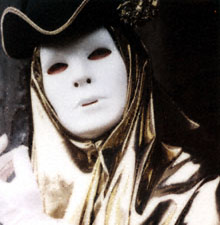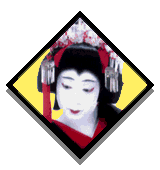Bedford Hamlet p.361 THR215 DramLit
script.vtheatre.net/215
You see? It's easy to understand where the modernity ends and POMO starts -- read Nietzsche!
Hamlet: A Guide to the Play by W. Thomas MacCary; Greenwood Press, 1998 Shakespeare after Theory by David Scott Kastan; Routledge, 1999
Shake pages in Theatre Theory : shake, scomedy and shistory

Rewriting Shakespeare: Elmer Rice's CUE FOR PASSION, Ruby
Cohn's SHAKESPEARE OFFSHOOTS
Lee Blessing's "Fortenbras" (play), John Updike's "Gertrude and Claudius"
Hamlet (1600-1601)
A revenge tragedy:
The revenge of a relative's murder or rape
The revenge of a father bya son or vice versa
The appearance of a ghost
The hesitancy or delay of the hero
Tricks or devices to achieve revemge
The use of real or pretended insanity
Suicide
Political intrigue in a court
An able, scheming villant or spy
Philosophical soliloquies
Sensational use of horror (murder and gore onstage)

12th Night
* SHAKESPEARE page in HamletDreams
Shakespeare, S. Comedy and S. Histories -- and other books and video pages.
Shakespeare Bedford
Several links to later playwrights: connections w/Shake!
Questions
The use of female performers became common practice during which of the following periods of theatre history?A. Greek
B. Roman
C. Elizabethan
D. Restoration
Notes
2004 case study: The Taming of the Shrew + Oedipus Rex The Simpsons’ HamletHomer says: Our next story is Hamlet by William Shakespeare
Bart says: Dad these old stories can’t compare with our modern super writers. … they kick shakespeare’s ass.
Lisa: But this story is more interesting than you think. It starts with Hamlet’s father getting murdered.
Bart: Cool
Lisa: Does he marry his mum
Homer: That would be hot.
William Shakespeare: The Complete Works, Deluxe Edition [UNABRIDGED] This complete and unabridged edition contains every word that Shakespeare wrote — all 37 tragedies, comedies, and histories, plus the sonnets. You’ll find such classics as The Tempest, Much Ado About Nothing and The Taming of the Shrew. This Library of Literary Classics edition is bound in padded leather with luxurious gold-stamping on the front and spine, satin ribbon marker and gilded edges.
The Riverside Shakespeare This gorgeous, boxed, two-volume set includes the bard's full canon of plays supplemented with 50 illustrations as well as 40 pages of color and black-and-white plates, critical prefaces to each work, detailed notes on the texts, and many other goodies. This second edition also includes Edward III and "A Funeral Elegy," which scholars now believe to be written by old Will, as well as new essays on stage history and criticism. The appendixes, chronologies, and bibliographies have also been updated.
Will in the World: How Shakespeare Became Shakespeare
There's no shortage of good Shakespearean biographies. But Stephen Greenblatt, brilliant scholar and author of Will in the World: How Shakespeare Became Shakespeare, reminds us that the "surviving traces" are "abundant but thin" as to known facts. He acknowledges the paradox of the many biographies spun out of conjecture but then produces a book so persuasive and breathtakingly enjoyable that one wonders what he could have done if the usual stuff of biographical inquiry--memoirs, interviews, manuscripts, and drafts--had been at his disposal. Greenblatt uses the "verbal traces" in Shakespeare's work to take us "back into the life he lived and into the world to which he was so open." Whenever possible, he also ushers us from the extraordinary life into the luminous work. The result is a marvelous blend of scholarship, insight, observation, and, yes, conjecture--but conjecture always based on the most convincing and inspired reasoning and evidence. Particularly compelling are Greenblatt's discussions of the playwright's relationship with the university wit Robert Greene (discussed as a chief source for the character of Falstaff) and of Hamlet in relation to the death of Shakespeare's son Hamnet, his aging father, and the "world of damaged rituals" that England's Catholics were forced to endure.
Hamlet (Folger Shakespeare Library)
Teaching Shakespeare : A Handbook for Teachers (Cambridge School Shakespeare)
Hamlet (Shakespeare Made Easy : Modern English Version Side-By-Side With Full Original Text) It is a tragedy that all actors seem to crave to perform, and the Renaissance Theatre Company clearly relishes the chance to present Hamlet for the ear. It is a contemporary cast from which one has come to expect superior Shakespearean acting on stage and screen: Kenneth Branagh as Hamlet; Sir John Gielgud as the Ghost; Derek Jacobi as Claudius; and Emma Thompson as the Player Queen. Unlike the Recorded Books version (Audio Reviews, LJ 8/90), this BBC edition may be a little hard to follow by those unfamiliar with the play's text, particularly since stage directions are not provided and speakers are not clearly identified. But the program does give the complete version, a rare treat, and the accompanying booklet offers insights into both the acting and the production.
Twelfth Night (Folger Shakespeare Library)
Shakespeare After All by MARJORIE GARBER
In Shakespeare After All, Marjorie Garber—professor of English and director of the Humanities Center at Harvard University—gives us a magisterial work of criticism, authoritative and engaging, based on her hugely popular lecture courses at Yale and Harvard over the past thirty years. Richly informed by Shakespearean scholarship of the latter half of the twentieth century, this book offers passionate and revealing readings of all thirty-eight of Shakespeare’s plays, in chronological sequence, from The Two Gentlemen of Verona to The Two Noble Kinsmen. With erudition lightly carried, Garber illumines the overarching patterns and lush details of the plays, closely attentive to what matters most in Shakespeare: language, theme, plot, and character.

Complete Shake:
12th Night
Amazon:
Shakespeare
Hamlet
"Very boldly put, I think Hamlet is about nothing. I think this is what Hamlet sees in nature. It will surprise no one who knows Lear that the relation between nature and nothing is a Shakespearean theme. Lear warns Cordelia, "Nothing will come of nothing" (I.i.89). Later he instructs Regan:O, reason not the need! Out basest beggars Are in the poorest thing superfluous. Allow not nature more than nature needs, Man's life is cheap as beast's. (II.iv.204-7)Then he goes on the heath, strips himself naked, and goes mad. Human nature reduced to nothing is nothing. There is nothing essentially there in nature to support man in his pretensions to be more than bestial. It is all a matter of his invention, of his creative urge to fill the gap he perceives.
Hamlet: A Guide to the Play
Book by W. Thomas MacCary; Greenwood Press, 1998
[ W. THOMAS MacCARY is Professor of English at Hofstra University. He has previously taught Greek, Latin, English, and comparative literature at the Universities of Minnesota, Texas, Michigan, and California, and at Columbia University. His previous books include Childlike Achilles: Phylogeny and Ontogeny in the "Iliad ( 1982), Friends and Lovers: The Phenomenology of Desire in Shakespearean Comedy ( 1985), and Plautus: Casina ( 1976). ]
menippeah theory ** the metasubject. [ Unlike other authors creating menippeahs, Shakespeare extended 'his own' plot in Hamlet by introducing still another special character with specific functions which only titular authors possess: he made the grave-digger to disclose to the readers important cues necessary for the proper evaluation of the events described by the unscrupulous Narrator. By doing that, Shakespeare factually depicted himself as the grave-digger with university education who does not lie in his grave. A similar feature is the case with some other Shakespeare's works, as well as with Christopher Marlowe's menippeahs Doctor Faustus and The Jew of Malta. ]
Critical Reading (Bedford Commentaries):
Coleridge
Freud (intellect against action)
Eliot
Hamlet: A Guide to the Play by W. Thomas MacCary; Greenwood Press, 1998
4. THEMES : ... "Metatheatre" is a term coined analogically with Aristotle's "metaphysics" to denote that turn of mind common to Shakespeare, Velsquez, Cervantes, and other great artists of the early seventeenth century (e.g., Abel, but see Calderwood 200, n. 26, for other references). Foucault has said very precise things about the continental exponents of this international movement, but he was relatively innocent of Shakespeare. He said, of Velásquez and Cervantes-and all the lesser French lights whom he knew well -- that they gave up on the Aristotelian proposition that art imitates life and decided instead that art is an imitation of imitation: it describes and defines the artistic process. This is a form of negation -- or rather a comment on the nothing that might be there but which art turns into something. If art can only define the artistic process, then what is its subject, and wherein does its truth lie? [questia.com]
Hamlet: The Corpse In The Bedroom
... Fall 2007 DramLit class : Unit II : From Oedipus to Hamlet -- Christ Idea (20 centuries between two heroes).
(*) Dante and Shakespeare? Hamlet Files.
... *Hamlet.ru -- Meyerhold, Smoktunovsky-Kosyntzev, Lubimov-Vysotsky, Tarkovsky (where?)

 From Oedipus (left) to Hamlet is one step... Alas, there is mr. Jesus in between.
From Oedipus (left) to Hamlet is one step... Alas, there is mr. Jesus in between.
 Never mind, Shaw (right)! I have Ibsen, Chekhov ...and Beckett on this page; the names ahead. It's easy to jump to Absurdism, than to XIX century Realism. Why? Because the clowns of Shakespeare loved MELODRAMA? This "little man", non-tragic (comic), asked for photographic look at him? How did Polonius evolve within the three centuries into Uncle Vanya? Ophelia into Nora...
Never mind, Shaw (right)! I have Ibsen, Chekhov ...and Beckett on this page; the names ahead. It's easy to jump to Absurdism, than to XIX century Realism. Why? Because the clowns of Shakespeare loved MELODRAMA? This "little man", non-tragic (comic), asked for photographic look at him? How did Polonius evolve within the three centuries into Uncle Vanya? Ophelia into Nora...



 Even if we ran through Moliere and the Neo-Classicism, Germans and Romantics, how to talk about Naturalism? Ibsen (left), Strindberg -- and Chekhov? Or "Naturalism" -- "Realism" -- "Symbolism"?
Even if we ran through Moliere and the Neo-Classicism, Germans and Romantics, how to talk about Naturalism? Ibsen (left), Strindberg -- and Chekhov? Or "Naturalism" -- "Realism" -- "Symbolism"?


